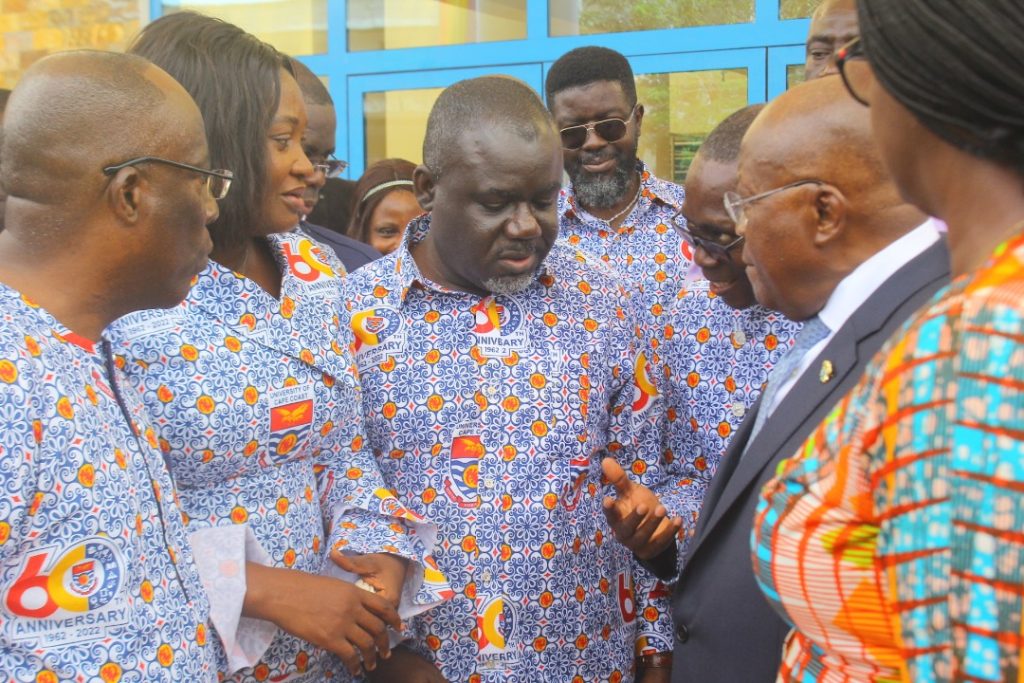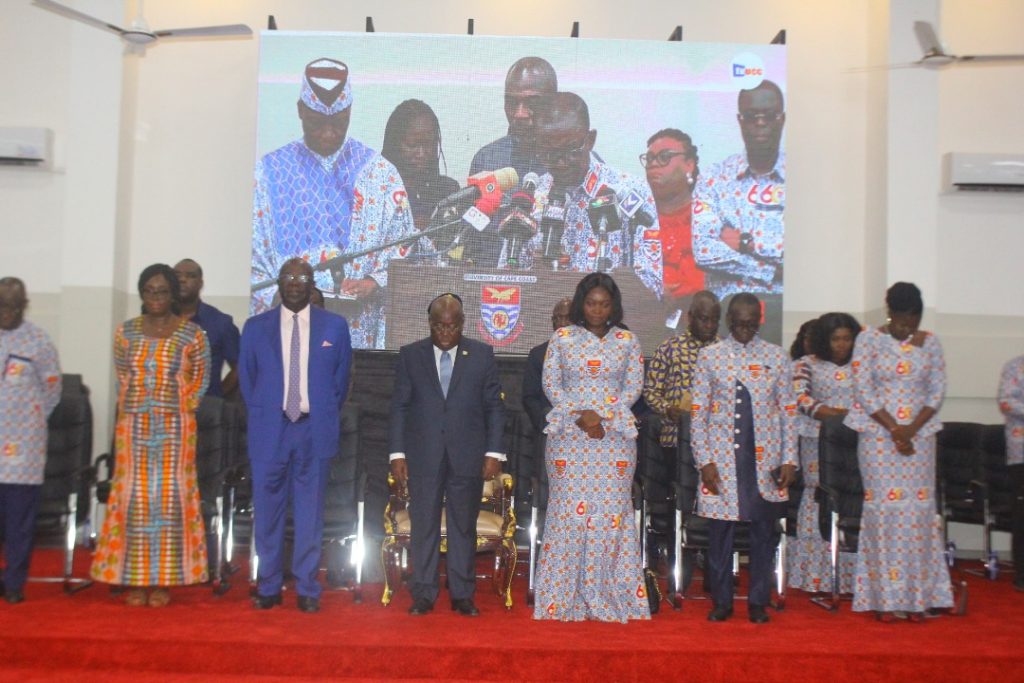By Prince Acquah
Cape Coast, Oct 20, GNA – President Nana Addo DankwaAkufo-Addo has assured of government’s resolve to retrieve all public lands that have been encroached upon across the country.
He said government was prepared to take the necessary steps to reclaim the lands to be used for the intended developmentpurposes for which they were legally acquired.
The President issued the caution while responding to an appeal by the Management of the University of Cape Coast (UCC) when he addressed the 60th Anniversary grand durbaron Thursday.
In the case of the UCC, President Akufo-Addo observed that almost one third of the University’s lands had been lost to encroachers, describing it as unfortunate and unacceptable.
“I am saddened by this state of affairs, especially because it is happening in Cape Coast of all places, the cradle of Ghana’s education,” he said.
He, therefore, called on the chiefs and all stakeholders to immediately cease further sales of the university’s land to ensure its advancement through a raft of planned development projects.
“We must begin to see the university not only as a national asset and an asset for the Central Region but, most importantly, as an asset for the people of Cape Coast in particular.”
Established in October 1962, UCC launched its 60th Anniversary on Thursday, April 21, this year, on the theme: “60 Years of Quality Higher Education, Expanding the Frontiers.”
The university started with an initial intake of 165 with two programmes in Arts and Sciences in 1962.
It currently has more than 74,000 students pursuing 425 programmes of study including Law, Medicine, Pharmacy, Nursing and Midwifery, and Optometry.
The anniversary is to celebrate its achievements and impact on Ghana and the globe in its 60 years of existence and reflect on its setbacks to re-strategise for higher feat.
The six-month-long celebration was marked by a number of activities including professorial and memorial lectures, health walks, college days.
The rest were media engagements, Chancellor’s Day, games and sporting activities, alumni homecoming, and awards and dinner night.
The colourful durbar, which crowned the celebration, was attended by hundreds of stakeholders including, Ministers of State, Members of Parliament and delegations from partner universities.
Minutes before the durbar, the President commissioned selected projects in the university including the School of Graduate Studies building, a six-storey guesthouse, and the School of Medical Sciences Laboratory and its Administration Block.
President Akufo-Addo commended UCC for its impact oneducation, business, agriculture and medicine and for blessing Ghana with a good number of competent personalities across all fields.
He commended Professor Johnson Nyarko Boampong, the Vice-Chancellor, for providing leadership to produce entrepreneurs in the face of complaints that universities were not producing enough practical-oriented graduates fit for the world of work.
“I assure you that government will do everything possible to ensure that this vision is realised not only at the UCC but also within the broader spectrum of our tertiary educational landscape,” he said.
“Indeed, this is the way to go if our university education is to remain relevant and continue to contribute to our national development.”
He charged the institution to remain “pure and unadulterated” in the provision of quality academic and intellectual discourseto find solutions to the complex problems across borders and disciplines.

Touching on the hardships bedevilling the Ghanaian economy, the President urged citizens to be patriotic and determined in unison to enable the country to surmount the difficulties hindering its journey towards prosperity.
Dr Sir Sam Jonah, the Chancellor of the UCC, urged alluniversities in Ghana to take active steps to wean themselves off government subvention if they were to remain relevant.
He observed that with the proliferation of tertiary educational institutions in Ghana, it was unsustainable for universities to rely on government’s scarce resources.
To maintain academic excellence and remain relevant, universities must find creative and innovative strategies for accessing funding.
“We should think out of the box in designing our fundraising initiatives. In this regard, we should tap into the alumni we have across the world,” he said.
“We must actively pursue public private partnership not onlyto expand infrastructure but also to increase the numbers of faculty staff. This calls for us to be even more entrepreneurial.”
Touting the achievements of the UCC, Prof Boampongexpressed pride in the university being adjudged the ‘Best University in Ghana and West Africa and Fourth in the world in the Times Higher Education World University Rankings’ for the second consecutive time.
He described the feat as unprecedented in the history of any university in Ghana, which demonstrated its contribution to education and impact on research in Ghana.
He said the authorities had undertaken a raft of initiatives including the construction of edifices to improve teaching and learning and enhance the quality of graduates produced.
Prof Boampong appealed to the President to give the school clearance to recruit new academic staff to improve academic work.
He observed that government’s Free Senior High School policy had resulted in a significant increase in class sizes for which reason new lecturers were needed to lessen the burdened on the overstretched academic staff.
He commended successive governments for their contribution to the growth of the University and pledged its resolve to continue to contribute to national development.

GNA